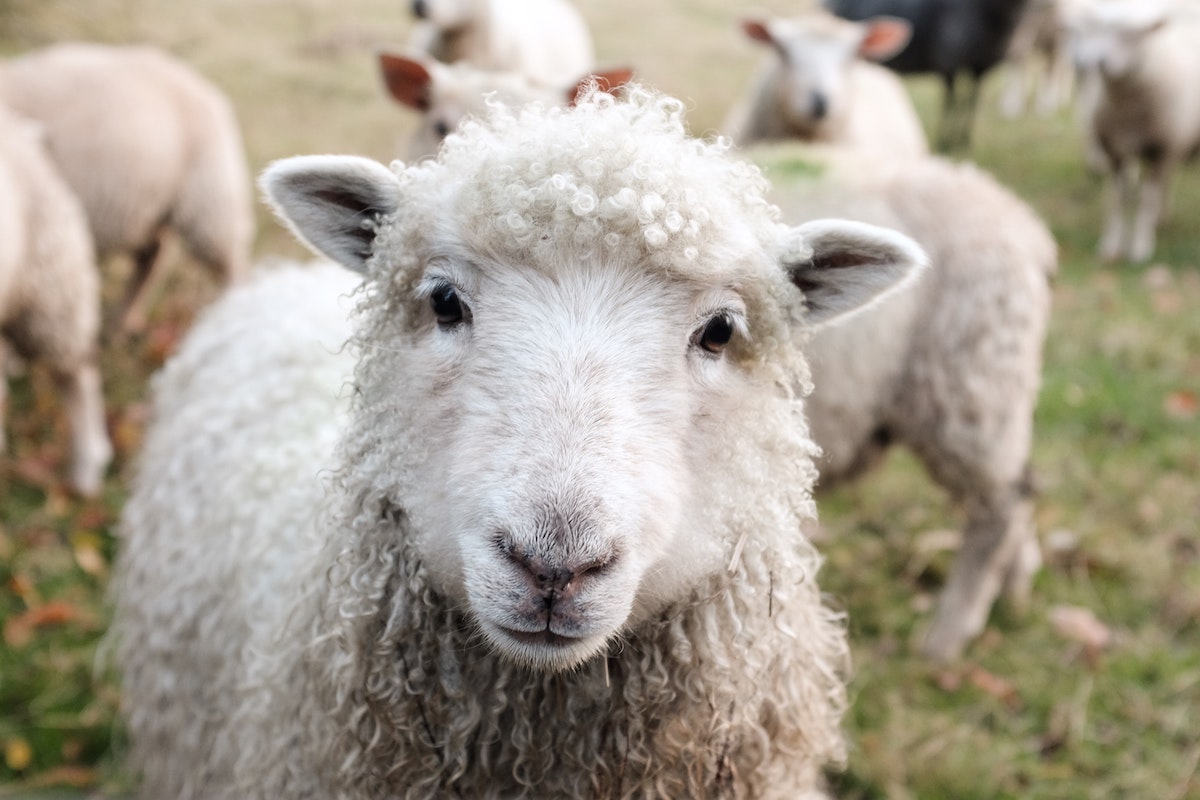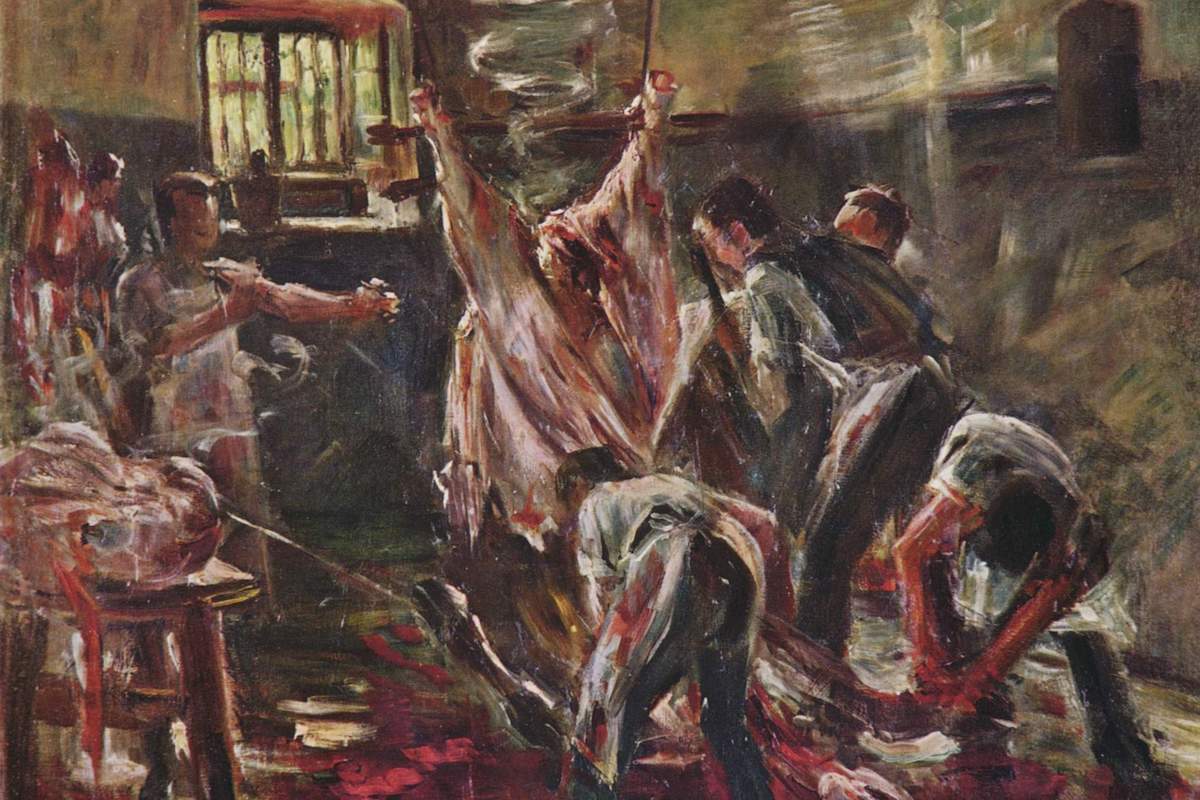Activism
The Hard Problems of Vegetarianism
Humans are gratuitously inflicting pain and suffering on intelligent, sentient creatures for no other reason than because they enjoy the taste of their meat, the texture of their skin, or the softness of their fur.

“We have to speak up on behalf of those who cannot speak for themselves,” wrote the famous utilitarian philosopher Peter Singer in Animal Liberation, the book that converted me (and countless others) to vegetarianism more than 10 years ago. You don’t have to buy into Singer’s pain-and-pleasure calculus to find the moral force of his argument compelling: Humans are gratuitously inflicting pain and suffering on intelligent, sentient creatures for no other reason than because they enjoy the taste of their meat, the texture of their skin, or the softness of their fur. They do so even though they know they could, at a small cost to themselves, live without it, and even though they share a virtually universal conviction that it is wrong to cause harm for trivial reasons. And yet, vegans and vegetarians remain a small minority.
Almost all of this meat, leather, and fur is being produced in factory farms that deprive animals of most of what would make their lives worth living. Driven by the relentless logic of profit-maximization, we curb the space available to them to the bare minimum, feed them food that is neither particularly healthy nor tasty, but helps them to put on weight quickly, and is replete with antibiotics, with all the disastrous long-term consequences that such a practice entails. It’s a system in which I don’t wish to be complicit. Even so, I will argue that the moral high ground often claimed by animal advocates (for whom the issues at hand are so obvious that they struggle to understand how anyone in their right mind could possibly disagree) is shakier than the movement would like to admit. Honestly addressing these shortcomings, I believe, would lend more credibility to the cause among sympathetic-but-not-quite-convinced onlookers, and make it harder to reject its central message outright because of some supposedly unaddressed internal contradiction.
In doing so, I will not spend much time on edge cases, neat and challenging though they may be. Vegetarianism (and veganism) is not refuted because it is self-defeating under certain hypothetical circumstances. The fact that I can imagine situations in which it would be morally justifiable to consume animal products says little about the value of vegetarianism as such. For example, I would eat meat if it were the only thing that could save me from starvation. I do not necessarily object to the killing of chickens that have lived a good chickeny life on a pastoral farm (terms and conditions apply), and I do think that animal testing for medical research can be justified in many—although not all—cases. While animal rights activists disagree on those issues, I don’t think they offer compelling reasons to reject the general idea, or that supporting any of them makes one an unprincipled hypocrite. Rather, they are a natural defect of any system of morality devised by fallible humans in the same way that not lying is a good social norm, but “never lie under any circumstances” isn’t. Therefore, philosophical thought experiments to tease your ethical intuitions will not be featured prominently in the following. My goal is to probe how well vegetarian norms generalize under the assumption that all borderline cases have been taken care of.
Fads and fashion
Perhaps the most astounding fact about animal rights is how comparatively recent the idea is. Humans have been rearing animals for millennia, and eating them for much longer. To our forefathers, it was almost inconceivable that livestock possessed any kind of moral status. Treating animals well—over and above what was necessary to ensure that they produced milk, eggs, leather, and meat—was far from the norm; saying that there was something wrong with consuming them would have created a lot of confusion in the best case. They would not even have known the terms vegetarian and vegan (coined in the mid-19th and mid-20th centuries, respectively). And it has only been very recently that these words became familiar to the general public. The question is, why is that so?
It’s tempting to put this in the context of the inevitable, if often bumpy, march of progress. Just like our views on homosexuality have been gradually transformed, moving its status from criminal offense to mental disorder to accepted behavior, it took time for humanity to become “enlightened” about the cause of animal welfare. Singer calls this the “expanding circle,” which encompasses an ever-wider range of beings and deeds. The danger of such a view is that it makes our own day and age more exceptional than they most likely are, which is of course an all too human attitude towards things. It makes you susceptible to believe that our era represents a kind of logical endpoint in our species’ moral development (incidentally, previous generations shared this conviction). Another way of putting this is that the notion that we have finally figured out the right way to treat animals should be discounted if there are other reasons that could explain why the issue has suddenly gained prominence. I’m thinking of industrialization, of course.
As human societies became more urban, more concentrated, more modern, the question of how to supply food to the hungry masses took on a whole new logistical dimension. The population density of newly emerging shanty towns and slums did not allow for families to continue to grow their own vegetables, raise their own chickens, or slaughter their own hogs. The tried-and-tested pastoral approach to producing food, the family farm—a source of much misplaced nostalgia—had to give way to a more scalable way of manufacturing the required calories. It should come as no surprise that factory farming developed in parallel with the industrialization of many other sectors of the economy, and with it all the problems that result from the massive concentration of livestock.
It isn’t easy to find a principled defender of the practice of factory farming these days (for a typical example, see this essay, in which the author insists that “[w]e must avoid the conflation of factory farming… with the entire concept of eating meat”). And yet it persists and dominates the market, unlikely to go away anytime soon. So, vegetarians won the intellectual argument, but gained little ground in terms of actual behavioral responses. In their steadfast advocacy for animal rights, this could easily lead to letting the perfect become the enemy of the good.
Scale and mechanization of the slaughtering process have made the killing psychologically more bearable for both slaughterhouse employees and consumers. Would the latter still be eating meat if they had to get their own hands dirty at least once? If you are inclined to say no, should we then not encourage things like hunting as a way to create a more meaningful, responsible relationship with the creatures that end up on our plates?
Maybe this will be dismissed as a rather silly and far-fetched point, and that may well be the case. It does, however, point towards some thorny issues to which moral purism is poorly suited. The historical observation that moral progress is not solely a function of changing convictions, but also of changing material conditions that make conforming to these convictions less costly, remains under-appreciated. Taking it seriously may require presenting meat-eaters with alternatives that are imperfect from a strictly vegetarian point of view, but stand a better chance of reducing animal suffering overall.

The problem of other minds
So far, I have not discussed the different philosophical arguments that are typically advanced in favor of animal welfare. This is partly because their strengths and weaknesses have already been examined at length elsewhere. The other reason is that I believe, despite all their differences, they all collapse into a version of utilitarian consequentialism in some non-trivial sense.
Our understanding of animals’ mental capacities has advanced tremendously since the days of Descartes’s “soulless machines.” However, decades of research have not brought us much closer to a subjective understanding of what is going on inside the head of a pig, a cow, or a dog. As Thomas Nagel famously argued, while we can understand how bats use echolocation to navigate, we do not understand what it is like to be a bat. We can, albeit with some difficulty, put ourselves in someone else’s shoes, but not in a horse’s hoofs, so to speak. Absent the experience of an animal’s qualia, we rely on somewhat crude behavioral observations to judge how our actions affect them. Pain and pleasure, joy and sadness are at least in principle observable, and they are typically used to justify who does and doesn’t count as a “moral patient.” Even those non-utilitarian theorists who hold that animal lives are intrinsically valuable will draw the line somewhere, and will not demand that bugs or amoebas be awarded the same rights as humans.
Now, if some form of utilitarianism underlies all animal welfare theories, the notion that animals’ interests need to be taken into account can be challenged by denying that the utilitarian calculus can be meaningfully applied across species. All it takes is to argue that we are not only quantitatively, but also qualitatively different from non-human animals. Both human and non-human animals suffer pain, yet presumably only humans are able to anticipate it, reflect upon it, and live their lives in dread of it. You can psychologically abuse and torture human beings, but you wouldn’t be able to achieve the same results with animals. Although far from the only reason for punishing criminals—we convict murderers even if the victim did not see it coming, died instantly and painlessly, and is not survived by grieving relatives—the mental landscape matters to ethical judgements. Those judgements, after all, are products of the mind as well, and thus differential treatment may well be justified.
The typical rejoinder points to what came to be known as marginal cases. There are humans whose mental capacities are extremely impaired for one reason or another, yet we emphatically refuse to treat them the way we treat cattle, pigs, or chickens. (Nor should we—saying that animals deserve to be treated better than we currently do does not imply that we should treat humans worse!) The problem with the argument from marginal cases is a different one: Firstly, while it is true that some humans lack the full conscious experience to which an ordinary member of the species has access, it is also true that there are no “super-feline” cats whose cognitive capacities are way above the typical repertoire—the situation is not symmetrical.
What does that mean? By treating animals (purely based on species affiliation) in psychologically damaging ways, we do not risk traumatizing them accidentally. Doing the same to people with intellectual disabilities, we cannot be so sure. This is a kind of consequentialist argument for speciesism, according to which, species membership is used as a proxy for a creature’s cognitive architecture. How much force it carries depends on how sure you are that an animal’s inner life is indeed qualitatively different from that of an average human.
Secondly, humans with severe brain damage will generally still be interwoven into the fabric of society, and other people will have a personal stake in their well-being, just like they have a stake in the well-being of their pet. Whether or not this justifies vastly different treatment is a tough question, but we have a strong inclination to treat human beings as ends in themselves.
For the good of whom?
But let’s move away from thought experiments and speculations. Let’s assume that we had, by divine revelation or other suitable means, collectively come to realize that vegetarianism is the correct philosophy. Even then, problems remain for which the vegetarian framework doesn’t provide obvious answers.
Is the individual animal the proper object of our concern, or should the preservation of a species trump those interests in cases where the two conflict? Suffering certainly takes place at the individual level, but we have already seen that this concept is fraught with difficulties. And there is the fundamental evolutionary reality that in the struggle for the survival of the fittest, the well-being of any individual member is secondary to the expansion of a species’ ecological niche, which is how genes maximize the copies they pass on to the next generation.
Have you ever wondered, for instance, why cows seem to show absolutely no inclination to throw off the yoke of their masters? While we can probably explain the fact that they don’t panic on their way to the slaughterhouse (but is that so obvious?), they don’t seem to resist any kind of restrictions placed upon them, unlike what a wild and untamed beast would do. It all makes perfect sense until you start thinking about it.
The most probable explanation for their behavior is an evolutionary one, in that domesticated animals co-evolved alongside humans to become walking, breathing sources of food. It’s been a great deal so far—there are 650 million pigs alive today (down from an 800 million high in 2013), compared to around 1,000 ferocious mountain gorillas or around 4,000 vicious tigers that remain in the wild. By giving away their meat, skin, and milk, farm animals have traded liberty for security, with stunning reproductive success. Few, if any, of these domesticated species could ever survive in the wild, for lack of foraging abilities or because their very tameness makes them easy prey. For all the horrors of factory farming, being torn to pieces by a pack of wolves is not exactly a peaceful death either, not to mention succumbing to droughts, floods, and pest-induced famines.
There’s a more general point about wildlife management to be made here. In discussions about animal rights, the question of what to do about carnivorous animals is sometimes raised. Is there not only a negative obligation to abstain from killing animals, but also an active role to be played in preventing nature’s very own wholesale slaughtering business? This is perhaps just idle speculation under current circumstances. But on a more practical side, invasive species pose a very real problem to certain ecosystems. Australia is famous for its struggles with foxes, donkeys, cats, and rabbits that were introduced by European settlers throughout the 19th century, but many other places have similar stories to tell. Goats on the Galapagos Islands, rats on South Georgia Island, sea lions in California, and stoats in New Zealand have brought many other local species to the brink of extinction, and eradicated others outright. Task forces have been established to hunt down these predators and restore the balance of the original habitats. From an animal rightist’s point of view, were they in the wrong?
There is one last aspect that relates to farming. Animal suffering is not only caused by factory farming, but also by the transformation of habitats into farmland, by plowing the soil and harvesting with heavy machinery. Maybe this is unavoidable, maybe it can be mitigated, but certainly not at no cost. Moving away from industrial farming techniques means using more land; reliance on less intensive methods of farming may result in making humanity more susceptible to famines, and certainly won’t help to feed a growing population. It’s true that there exist some promising attempts to get rid of industrial fertilizers and thereby lessen farming’s negative impact on wildlife. The downside—besides the open question of scalability—is that these farmers rely on manure instead, which is much more expensive than buying readymade fertilizers, and really only makes sense if the farmers can monetize their investment by eventually slaughtering the animals that produce it. Add all of this up and suddenly we are talking about real sacrifices, not just giving up steaks and sausages. How confident are we that we will get the utilitarian calculus right this time?
The expanding circle
For communist luminaries, the utopian society was one in which the very concept of class had withered away. Like most of its predecessors, this version of utopianism suffered from a lack of dynamism. It was static in the sense that any deviation from pursuit of the “perfect” arrangement would, by definition, lead to a less-than-perfect and thus less desirable state of affairs. Once utopia had been established, the cause on which it was built would lose its significance—what is the point of religion in heaven, or of seizing the means of production once private property has been abolished? Unsurprisingly, then, we now use the word “utopian” almost synonymously with unrealistic, detached from reality, or just plain crazy.
Nevertheless, a committed animal advocate ought to be asked what kind of utopia they have in mind when advocating for their cause. At what point would our society have advanced so far that any remaining injustices towards animals are either so insignificant that we should spend our time tackling other problems, or so entrenched that we’re likely to do more harm than good in trying to solve them? Would hunting still be allowed? Could we still have pets, and if so, under what conditions? Would we actively be managing wildlife or let things run their course? Could we continue to slaughter and consume animals that had enjoyed a long and fulfilling life? And assuming that animal testing would still not be entirely replaceable by artificial means, should it still be legal? These are very different questions from whether one should, here and now, personally consume animal products, but it is worth reflecting on how well these individual norms can be universalized, and what kinds of implications this generalization would have. If we are then led to believe that widespread adoption of such norms would have disastrous consequences, this should make us rethink how defensible those norms really are.
I don’t want to stipulate that the problems raised in this article could not be addressed, refuted, or circumvented, much less that they disprove the whole idea of animal welfare. What I do want to suggest, however, is that whatever answers one may find to them, they make the case for vegetarianism much less straightforward and obvious, and appeals to intuition or to shared moral convictions are unlikely to convince the skeptics. This should not stop anyone from challenging the status quo and urging people to rethink their attitude towards meat consumption. But it should give pause to the most fervent of zealots—quite apart from the fact that an overly moralistic approach to others’ private decisions is likely to backfire.






